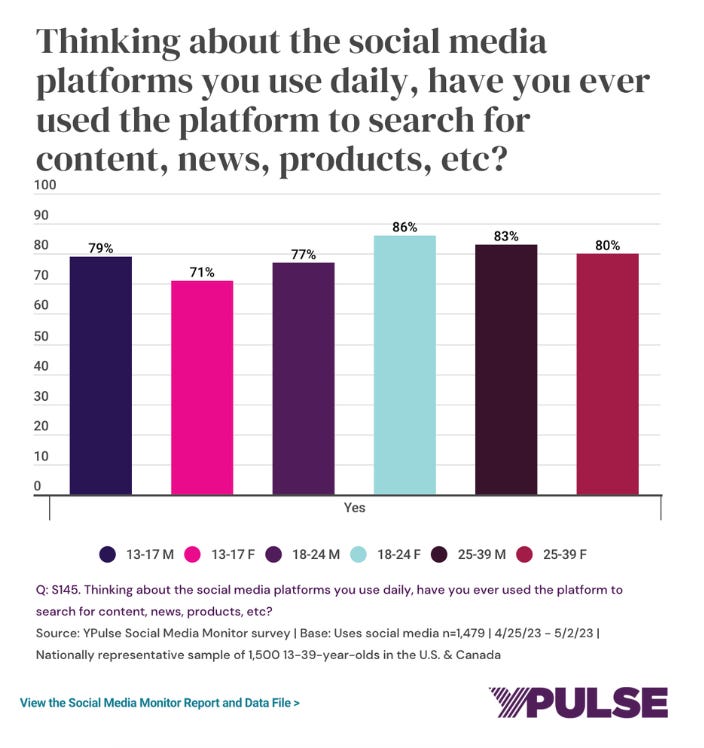Fear & Loathing In SEOville
Why Generative AI Has SEO Pros Panicking & What You Should Do About It
(This article was originally published on my LinkedIn profile on May 24, 2024.)
Search engine optimization professionals are scared shitless. I suspect many other people are, too.
Two recent events have left a deep impression on me. The first was a networking event on the topic of SEO jobs featuring Nick LeRoy, who is a local #SEO consultant and publisher of SEOJobs.com.
I was not looking for a job myself but rather was hunting for talent.
But it became clear over the course of the evening that a lot of search engine marketers are worried about the state of the industry and, as a result, are worried about their jobs.
LeRoy had just published an analysis of job listing data for search engine optimization openings that found a decrease in postings of 37% in Q1 2024 from 2023.
So there’s cause for concern. The primary culprit for the decrease is believed to be AI, specifically generative artificial intelligence.
LeRoy posed a reasonable interpretation of the decline in SEO job openings:
Tasks historically mapped to an entry-level position are now being done faster and cheaper with AI technology. Gone are the days of needing to map redirects or write metadata manually. This forces SEOs to level up in their careers quicker than previously required.
Historically, an entry-level SEO could provide immediate value by executing manual tasks (now taken over by AI technology) while learning how to manage clients, pitch to c-suites, and more extensive soft skills such as critical thinking and effective communication. These entry-level SEOs are now expected to have a base-level knowledge of search AND the soft skills to compete against their mid-level peers with 3+ years of experience.
The data at the top of this article shows that SEO roles at the “mid-level” have been impacted most. Companies want to “do more with less,” which means hiring cheap junior resources and paying for proven experience/results via senior SEOs.
Fast-forward to last Friday and the annual MN Search Summit, organized by the MnSearch - Digital Marketing Networking: Of the 15 keynotes and sessions, seven sessions and two keynotes were devoted primarily to the topic of AI.
The focus of my attention at Tunheim for the past two years has been on generative #AI, so naturally, every session I chose to attend had to do with artificial intelligence. These are the titles of the sessions I went to:
How to maintain your job relevance in an AI world (Keynote)
Don’t Lose Your Head or Your Brand over AI
The New Sp[AI]ce Race
The Impact of AI in SEO: How is it Going and What to Expect Next (Keynote)
Generative AI Governance: Policies & Processes for Marketing Teams
Improved Content Analysis with GA4 Explorations & AI
AI Is BAD
AI is bad.
That is the message I heard loud and clear from nearly every session I attended.
The fear was palpable.
Nearly each session devoted the first fifteen minutes or so to why artificial intelligence is awful. If you’ve been paying attention to AI at all during the past two years, you’ve likely seen the headlines:
The venerable Sports Illustrated hires a vendor who uses ChatGPT to write inaccurate stories by wholly fictional writers that SI then publishes,
Marvel Studios produces an animated intro to the show Secret Invasion based on AI-generated imagery,
Microsoft’s chatbot Tay quickly devolves into a Nazi,
A law firm’s attorneys use ChatGPT to argue their case only to find the chatbot fabricated the case law upon which they based their suit. (I mean, that’s just an incompetent counsel if they have to use a chatbot to learn how to win their case.)
Yes, there are instances of people putting it to ill-advised uses and there are most decidedly drawbacks to the technology as it stands today. Foremost among those drawbacks are:
Hallucinations (or, as we scientists call it, making shit up).
Stereotyping (although this can be mitigated against via awareness and clever prompting).
A lack of diversity in its training data.
The lack of compensation for using the content on which these models were trained.
Forgetfulness. When you get to the close of a context window (AI’s memory system), the responses begin to deteriorate, which is where I’ve found the quality and truthfulness of the responses begin to break down. It’s like the AI gets tired.
Hands. Every image-generation model is pretty inept at generating an accurate hand. It’s maddening.
Oh, and this technology consumes a massive amount of electricity, and, you know, climate change and all.
First, this is the very early stage of generative AI development. These are known problems and there are many people at work trying to solve them. (Except for climate change, of course.)
Second, this technology has advanced and improved in leaps and bounds during the short two years since I’ve been paying close attention to it. It has evolved and spread in light years time compared to the decade it took the internet to profoundly reshape our lives.
Hell, I thought it was going to be three to five years before AI-generated video would improve to the degree that ChatGPT had and then OpenAI releases videos created with Sora.
Third, it is spreading faster and wider than any technology I have seen in my lifetime.
It is reshaping search. It is reshaping social media. It is coming for productivity apps. It is reshaping creative production. It is reshaping programming. It is putting a very powerful tool into everyone’s hands, especially now that Apple has promised on-device AI.
There’s a reason money is flooding into development of this new technology in a way that never occurred with crypto, blockchain, and–gawd-forbid–freaking NFTs.
But that’s not what made these people fearful. What was worrying them was that AI is about to make them obsolete.
That fear is not at all unfounded. There’s clear evidence that AI is at least making the work of SEO much harder but there’s also evidence that AI will make some of the drudge work of SEO a breeze.
SEO Is Evolving
There’s also the common sense perception that a tool like generative AI can do some of the grind work--like cleaning up transcriptions for Video SEO--practically instantaneously. I built a custom GPT to do just that. It’s a fantastic tool.
Look, SEO work has always required an understanding of how search systems work, some technical fluency in HTML, JavaScript, database technology, and the functioning of CMS systems, an understanding of human psychology and behavior, and some content, language and detective skills to excel.
Understanding how systems work? That skill alone is applicable to many things beyond SEO work but, I would argue, it is the most valuable skill right now. Large Language Models and generative AI are just new systems to be deciphered.
But It wasn’t just SEOs at the conference who were afraid.
Content creators are worried, too. One man, a writer, said of his employer, “they are requiring us to use AI to train ourselves out of a job.”
That’s a legit worry.
But if you’re a writer, presumably you have language skills and an imagination. Those are two of the primary skills you need to get the best results from AI.
English is the new programming language. Start applying those skills to getting the AI to do other valuable things rather than just writing content.
There is no doubt that generative AI is a very disruptive technology. But it ain’t going away. It’s only going to become more pervasive. So we need to adjust.
If you’re creating or optimizing commodity content, then, yeah, you probably should be looking to up your game or get out of the game entirely.
Ultimately, people will always search for answers and there will be no shortage of people who want to provide the answer. And that’s the sweet spot where content producers and SEOs thrive.
It’s just that the answer engines are changing.
This is a time to adapt.
5 Optimization Adaptations To Consider
1. Pay Attention To Chatbot Results
Conversational computing has arrived. Start playing with the chatbots now to understand how they deliver answers and what they say in response.
Use them as a normal consumer would and pay attention to how your behavior changes as a result of your use. Learn how the underlying technologies–LLMs, Transformers, Neural Networks, etc.--work to help you better understand how they process information and produce results.
Ask them to identify their sources for responses. Use Gemini’s Ask Google button.
2. Give Bing Some Love
Yeah, we kinda knew that Bing existed but with Microsoft’s search engine accounting for three to six percent of search engine market share, depending on who you ask, Google has always commanded the preponderance of our attention.
But consider that Bing search is built into ChatGPT and Microsoft’s Copilot and now, with the AI generated social media prompts, in LinkedIn as well.
It’s time to rethink how we prioritize Bing as a discovery channel.
3. Social Search
We’ve known this for some time but it bears repeating that younger consumers are as likely to turn to social media as they are to search engines as a discovery channel. As a 2023 YPulse survey makes clear, the vast majority of consumers aged 13-39 have used social media as a search engine.
Put your sleuthing skills to work figuring out how to make your content visible within social search.
4. Optimize Expertise
One of the biggest things holding generative AI back right now is its propensity to confidently state falsehoods.
The AI companies know this. AI developers know this. That’s why there’s such a flurry of research and testing attempting to solve that problem.
According to Jason Barnard at Search Engine Land, Google’s March 2024 Knowledge Graph update focused on “Person” entities.
He writes: “Person entities in the Knowledge Vault increased by 17%. The biggest increase (+38 %) was among Person entities with E-E-A-T-friendly subtitles (researchers, writers, academics, journalists, etc.).”
What does that tell you? Google is focusing on credible sources of factual knowledge. It doesn’t take much reading between the lines to see that Google is focusing on bolstering its source of credible, factual training data for Gemini.
I’ve been advising clients that optimizing thought leadership is one component of the answer to the discoverability crisis AI chatbots pose.
5. Optimize For Human Psychology
A lot of search engine optimization work addresses the technical implementation of tactics designed to gain visibility within a set of search results.
Is the website we’re trying to earn traffic to technically sound?
Can it be easily read by Googlebot?
Do we have a working XML Sitemap?
Are we blocking anything with robots.txt?
How fast do the pages load?
Is the SSL cert properly installed?
Does the site respond appropriately on mobile devices?
Are we using schema properly?
Where within the technical infrastructure of the site are we populating keywords?
SEOs spend some time considering the psychology of users.
Is this or that TITLE/DESCRIPTION combination more likely to elicit a click in the search engine results pages (SERPs)?
Is the landing page going to be perceived as relevant based on the SERP?
What is the user experience of the landing page like?
But that’s a very narrow slice of user psychology.
I strongly believe that successfully bridging the transition from search-centric discoverability to AI-centric discoverability is an intimate understanding of your target audience’s psychology.
When we can see the world through our target audience’s eyes, the solution for how to reach them will write itself.
That means fulfilling their needs in a very deep way: Satisfying their informational needs, yes, but also in a way that aligns with their personality and is in harmony with their emotions.
If you can add sociological and psychological insights shaped by emotional intelligence to your skillset, you’ll have the tools to rise above the torrent of AI-created schlock that’s soon to come.







